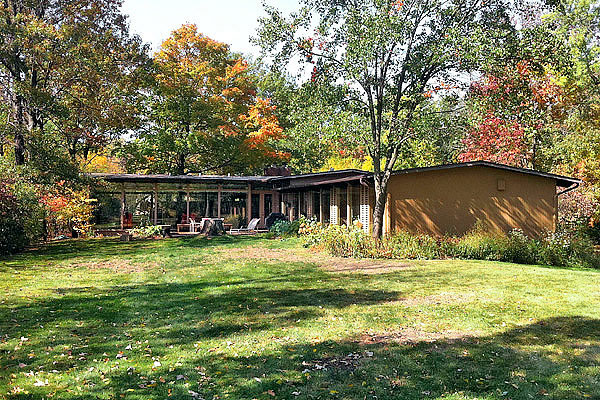
Photograph: Dennis Rodkin
A Keck & Keck house in Flossmoor
Q: Susan in Lake View asks: I’m looking to buy a mid-century modern house and everyone is warning me against it, saying it won’t re-sell well. True?
A: It is harder to sell mid-century homes than to sell something more standard like a Colonial, Susan, but it’s not so difficult that you should shy away from them if you like their style.
There’s no solid data tracking Chicago-area mid-century homes as a separate set of sales. But it just so happens you’ve asked the right person. I’m a big fan of mid-century modern design (not only in architecture, but in sculpture and jewelry as well). Homes in the style are characterized by an openness to the outdoors, ample use of natural materials, and sometimes eccentric shapes and angles. The mid-century modern house style is very popular these days in southern California and has fan clubs here, too. Chicago was one of the birthplaces of the movement, thanks to Frank Lloyd Wright, Keck & Keck, and other innovators.
Speaking anecdotally, without the benefit of hard data, I can say that while mid-century homes can be a challenge to get sold because they’re outside the norm, they do get sold.
There have been some relatively fast sales of mid-century homes in the past 18 months:
• This updated Hummrich design in Riverwoods sold in just four months, for $630,000, or 94% of the asking price.
• A Lake Forest home where a member of the Walgreen family lived sold in less than a month.
• And one with a golf course view in Glencoe went under contract in about a month and closed at 94% of the asking price.
But we’ve seen a few linger on the market and/or take big price cuts:
• This one in Flossmoor has just gone under contract after 10 months on the market and price cuts that took it down 11 percent, from the original ask of $449,000 to $400,000. (Until the deal closes, I won’t know the final sale price.)
• A sharp one on a big lot in Budlong Woods took three years to sell and went for just 46.7% of the original asking price.
Several of these are luxury-priced homes, at a price level where buyers don’t always have to be entirely practical in their choices. Some buyers without renovation money may find a mid-century home impractical—particularly because of the period’s small bedrooms and kitchens, and high utility bills if the glazing and caulking of those ample windows haven’t been updated.
And some people find the whole rocks-and-overhangs thing scary, as this hilarious site points out.
But on the other side are buyers who will appreciate the home’s openness, modern lines and reflection of nature. For them, a mid-century home in good condition is a dream. And don’t forget that the older a house style gets, the more affectionate we become about it. You may simply be ahead of the curve; when you’re ready to sell, more people may have caught up with your taste.
Q: Regina in Cicero asks: My elderly aunt will be moving into a senior facility and I would like to purchase her pre-war era East Lake View condo. What is the best way to determine a fair price? It is in a well-maintained building but the unit itself was last remodeled in the 1960’s (bathroom and kitchen look ancient) and is not comparable to other updated units.
A: Regina, the most reliable way to determine value is always to call in an appraiser. It won’t matter too much to a skilled appraiser that your relative’s condo is not updated like others in the building. The appraiser will be able to reverse-engineer the value of your relative’s unimproved condo by looking at improved condos and estimating—or getting a contractor to estimate—what it would cost to get the condo up to present standards.
Here are some made-up figures that show how it would work: Let’s say the appraiser determines that two-bedrooms in the building are going for $150,000 and that your aunt’s two-bedroom needs $50,000 in upgrades to be comparable with them. This gives the appraiser a value of about $100,000, which would then be subject to other adjustments for differences in views, parking, and other features.
What’s your Chicago real estate question? Ask me! Dennis@rodkin.com



